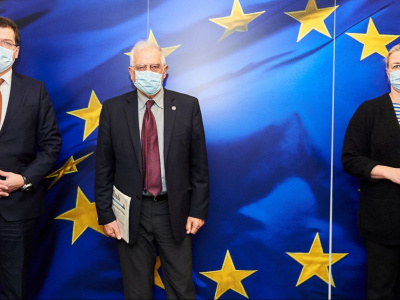
Koen Vervaeke on the future of EU-ACP and EU-Africa relations
This interview was filmed on the fringes of an informal high-level seminar on post 2015 and beyond 2020: What new perspectives for Africa-EU and ACP-EU relations? Vervaeke, Director for Horn of Africa, Southern Africa and the Indian Ocean for the European External Action Service in Brussels, says that a contractual engagement such as with the ACP is an important lesson for improving the political relationship between EU and Africa.
He answers questions about how an economic crisis in Europe impacts on the relationship, as well as how to deal with emerging economies, adding that "Africa should recognise the specific added value we as Europeans bring to them"
Transcript
I think what is the strength of our relationship EU-ACP is that we have continuously been able to adapt ourselves to new realities. It is very important also what we have done today, here at ECDPM to discuss with our African partners and our ACP partners what the future will bring. It’s very difficult to look into a crystal ball, but we are sure that ACP countries will have their place in global politics and economic field will grow in the next 10-20 years.
Can you take the ACP-EU approach of joint decision making into an EU-Africa strategy?
What is important in the ACP, and something I learned today, is the emphasis on the contractual engagement. I think it is something very important. We should not lose gains we have got from the ACP format, because it is important. Whereas the EU Africa relationship is a more political one, and not totally effective: I think we have to recognise that. When we go to the EU-Africa summit next year, that will be one of the key points, how can we make this political relationship more effective. ACP and the contractual one, let’s try to keep that, but within that framework, let’s also serve our more political interests, diversify security interests on a more geographical basis.
How does an economic crisis in Europe impact EU-Africa relations?
All these things affect relations. If there is a recession or standstill in Europe, it affects economic growth in Africa. Many African countries come to us and say ‘our exports to Europe has been affected by slow growth’. On the other hand, with our development assistance, we keep our strong engagement also for the next seven years, at European level, our multi-annual financial framework, still a lot of continuity on aid. But we will look differently to Africa of course in the future. We believe that part of our growth in Europe will have to come form Africa.
How are emerging economies impacting on EU-Africa relations?
It’s good that Africa attracts much more interest, not only from Europe, but also from new emerging powers like China, Brazil, through the specific relationships that the BRICs are building is also part of that. I think it’s not diminishing the importance of the EU. It highlights the specific added value of the EU is bringing to African counties because our interests are more diversified. Certainly we have an economic interest in the continent, and I think that’s important, it’s good to have a relationship build on shared and clear interests. But we go beyond that. When the Prime Minister of Ethiopia was received by EU President Van Rompuy last week in Brussels, he said “we have a lot of interest from other partners which are very much centred on interest driven investment, but Europe for is different, it’s value interest investment”. That includes economic interests, but it goes beyond that. It think this is a very good illustration of how we do. We do the difficult things in Africa, a lot of capacity building, a lot of social work which goes much beyond the economic interest, but it’s the globality of our investment which is important. I think we talk with these emerging powers, with China, with others, whether we can build bridges and develop common approaches in Africa, but Africa should also recognise the specific added value we as Europeans bring to them.
